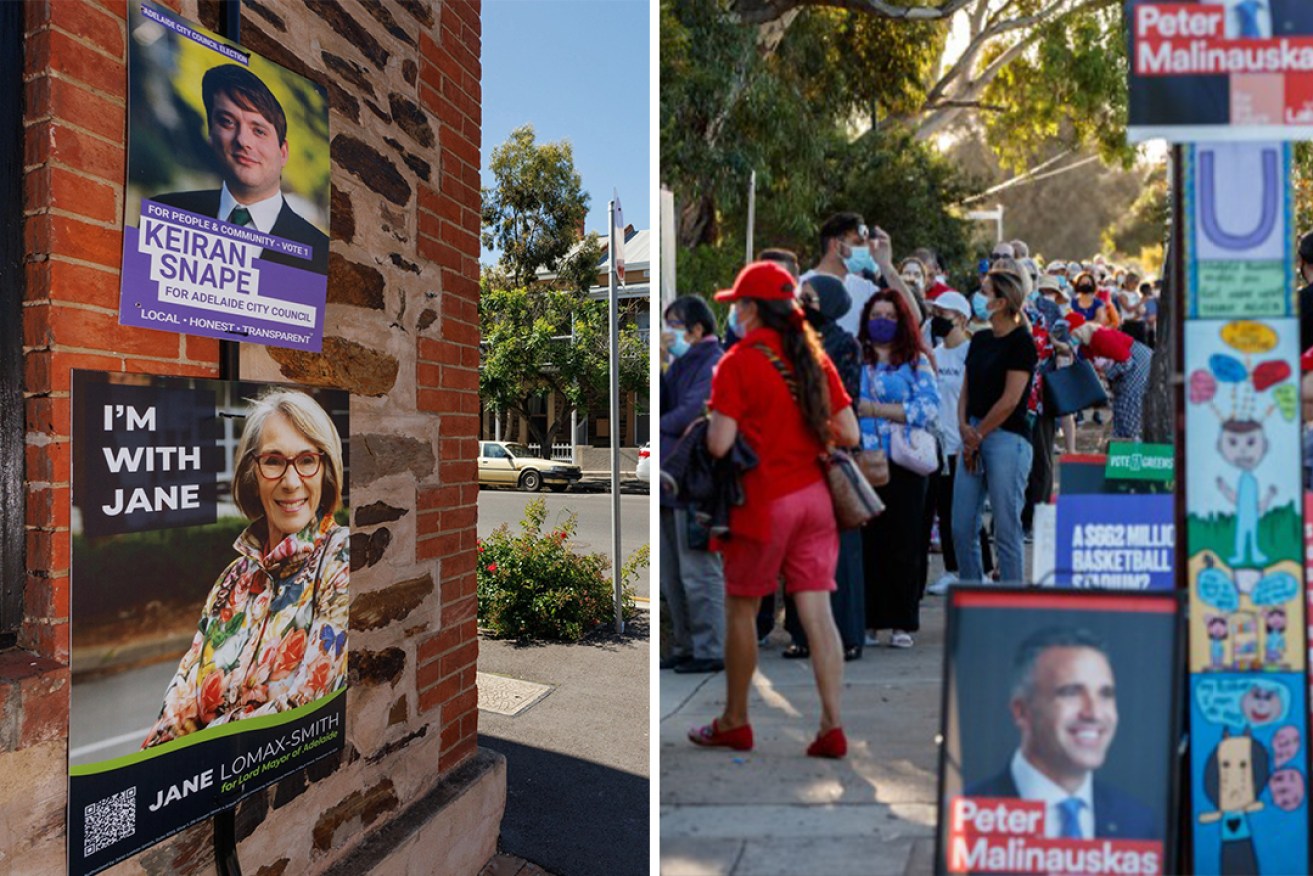‘Voter fatigue’: Call to reform local government election timing
An eastern suburbs council has called on the state government to shift the timing of local government elections so they’re not held in the same year as the state election, arguing the move could increase voter turnout and relieve pressure on the Electoral Commission.


South Australians voted in local, state and federal elections in 2022. Left photo: Tony Lewis/InDaily; right photo: Matt Turner/AAP
Norwood Payneham and St Peters councillors last week unanimously passed a motion calling on the Local Government Association of SA (LGA) to write to Local Government Minister Geoff Brock to “[request] that the state government change the timing of periodic local government elections to ensure that local government elections are not held in the same year as state government elections”.
The motion calls for the two polls to be “ideally two years apart”.
It comes after some voters in the Norwood council area were asked to vote in four separate polls last year, starting with the state election in March, the federal election in May, the Bragg by-election in July and local government elections in November.
It was the first time since 2010 that South Australians have gone to the poll three times in one year.
Mayor Robert Bria said it was time the state government took a “serious look” at adopting the Victorian model where local government and state elections are separated by two years.
“Clearly, having three… elections in the same year with constant campaigning, corflutes, letters, door knocking and other materials and offering no respite for voters between elections can be exhausting,” he said in a statement.
“South Australia faced the same situation in 2010, which should have been the trigger for a review of the timing of local government elections at that time, but sadly this did not occur.”
Bria said the council passed a similar resolution in September 2018 asking the LGA to push the state government to “investigate the merits” of changing the election schedule, but the motion was not supported at the association’s 2018 annual general meeting.
In a submission to councillors earlier this month, Bria said the state government should consider the changes as it could address “voter fatigue” and “workload issues for staff” at the Electoral Commission of South Australia (ECSA).
He also said the changes could lead to “increased focus on local government to potentially increase voter participation”.
“While it could be argued low voter participation rate will continue for as long as there is voluntary voting in local government elections, a change in the timing of the elections so they do not coincide with state and/or federal elections in the same year may generate greater community interest and therefore, increase voter participation,” Bria wrote to councillors.
Statewide voter turnout for the 2022 council elections reached 34.54 per cent, a marginal increase on the 32.94 per cent turnout in 2018.

Turnout for South Australian council elections since 2000. Table: City of Norwood Payneham and St Peters
InDaily asked Local Government Minister Brock whether he was open to moving council elections to another year.
In a statement, he said: “The Electoral Commissioner is undertaking a review of the election. Similarly, we will be working to review how participation in the Local Government election can be improved.”
“If from the review, the timing of the elections emerges as an issue, this would be considered at the appropriate time.”
For at least the last 15 years, ECSA has recommended the state government investigate changing the timing of local government elections.
The commission highlighted voter fatigue as an issue in its election reviews of 2006, 2010, 2014 and 2018. An ECSA spokesperson said it has “strongly advocated” for reform on this issue in the past.
In August, SA Electoral Commissioner Mick Sherry told a parliamentary committee that ECSA was two months behind in its preparations for the November local government elections due to the state election and Bragg by-election.
LGA CEO Clinton Jury said the association was already holding talks on how to improve the next cycle of council elections.
“There’s merit in revisiting council election cycles, and the LGA is already in discussion with the Electoral Commission of SA and the State Government to explore the opportunities for change,” he said in a statement.
“This extends to the timing of elections, method of voting, use of election signage and the nomination process.
“Significant reforms were made by the State Government to the Local Government (Elections) Act prior to the 2022 council elections and we’re keen to work with our sector to assess any impacts these changes had on the elections.
“We’ll be working constructively with ECSA, Minister Brock and SA councils to review what worked well, and what can be improved.”




